 First Important Match First Important Match
 Meeting Farmer Burns Meeting Farmer Burns
 Off to Alaska Off to Alaska
 His Two Greatest Foes His Two Greatest Foes
 Frank Gotch, Superstar Frank Gotch, Superstar
 In Retirement In Retirement
 At His Peak At His Peak
 Meeting Top Celebreties Meeting Top Celebreties
 His Death His Death
 His Fame Endured His Fame Endured
 Others' Words on Gotch Others' Words on Gotch
 The Controversy The Controversy
 Frank's Legacy Frank's Legacy
 Sources Sources
|

The Controversy
Though most wrestling "experts' rank Gotch the greatest wrestler of all time, there
is still controversy swirling around his legendary matches with George Hackenschmidt
in 1908 and 1911. Frank died in 1917 and Farmer Burns died in 1937. Shortly after,
the Hackenschmidt supporters began their spin. Hackenschmidt lived until 1960, and was
a legendary weightlifting and bodybuilding icon, as well as a wrestling legend. The
writers of the 1930s, 1940s, 1950s and so forth simply could not believe that any man
could defeat Hackenschmidt in a fair match. Hack, a man of tremendous ego, allowed the 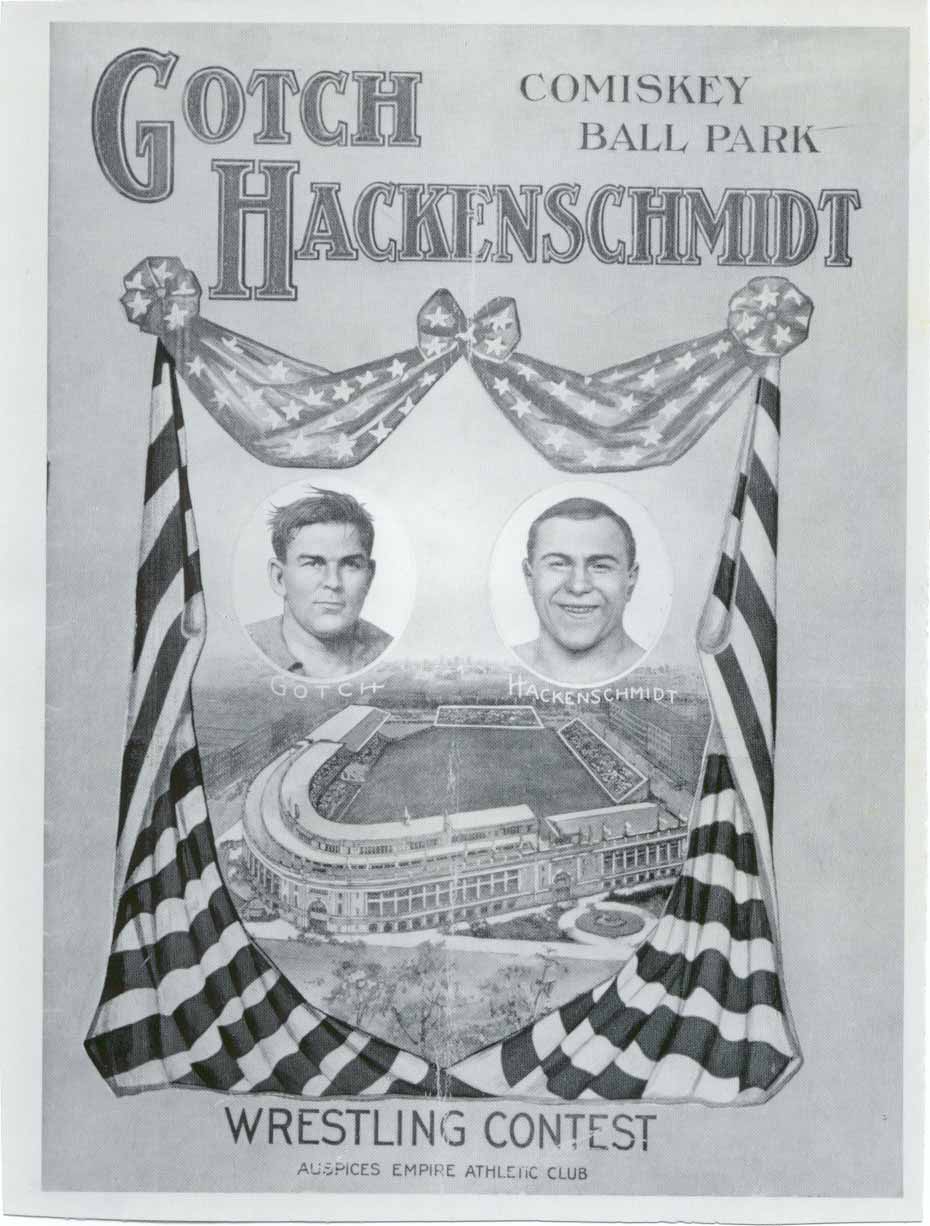 writers to believe that Gotch won by foul methods. Since Gotch and his trainer, Farmer
Burns, were long dead, the bodybuilding/weightlifting writers began their spin, saying
Gotch wrestled dirty.
writers to believe that Gotch won by foul methods. Since Gotch and his trainer, Farmer
Burns, were long dead, the bodybuilding/weightlifting writers began their spin, saying
Gotch wrestled dirty.
Actually, the spin began earlier, as far back as 1908. Gotch had simply outsmarted
Hack in the ring in 1908. Knowing how strong Hack was, Gotch devised a strategy to
move him around the ring, head snap him, under hook him, and tire him out.
Hackenschmidt was used to winning in minutes, catching foes with his bear hug and
forcing them to the mat. When he couldn't catch Gotch in such a move, he began to
lose his confidence.
Truth is, Gotch "rope-a-doped" Hackenschmidt in much the same fashion Muhammad Ali
outsmarted George Foreman in Zaire in their classic fight in 1978. Like Hackenschmidt, 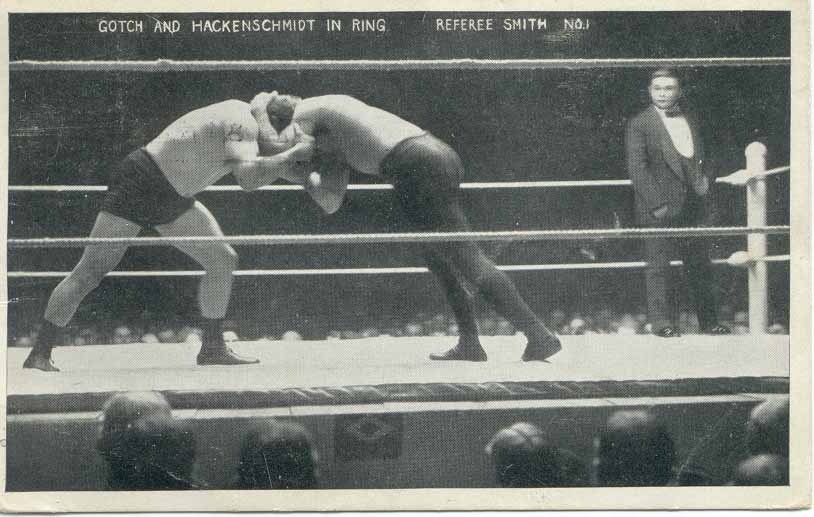 Foreman was considered unbeatable and far too strong for Ali. So Ali made it a match
of styles, forcing Foreman to fight his style. Foreman couldn't adjust and was knocked
out. Gotch forced Hackenschmidt to wrestle his style, and Hackenschmidt couldn't
adjust, either. He surrendered after two hours and three minutes. In the dressing
room, Hack was quoted as saying Gotch was far too good for him, or anyone else.
Foreman was considered unbeatable and far too strong for Ali. So Ali made it a match
of styles, forcing Foreman to fight his style. Foreman couldn't adjust and was knocked
out. Gotch forced Hackenschmidt to wrestle his style, and Hackenschmidt couldn't
adjust, either. He surrendered after two hours and three minutes. In the dressing
room, Hack was quoted as saying Gotch was far too good for him, or anyone else.
Back in Europe, Hackenschmidt had to face unbelieving fans and press. Promoter Jack
Curley wanted a rematch, knowing how much money it would bring in. Hack began bad-mouthing
Gotch all over the continent. Gotch, hearing the stories in America, was stunned and
hurt. Then he turned angry. He went to Europe and whipped a good English wrestler
named George Dinnie, who had been taunting Gotch, believing the Hack stories. Here's
what Dinnie had to say after wrestling Gotch and being demolished:
"Gotch is the most wonderful of all the great wrestlers I have met.
Hackenschmidt altogether takes a back seat. Gotch worked with his brains as well as
with his body, in a way Hackenschmidt could never do. He is strong and move likes
lightning. A man stands no chance against him. He is a master of ring craft. I have 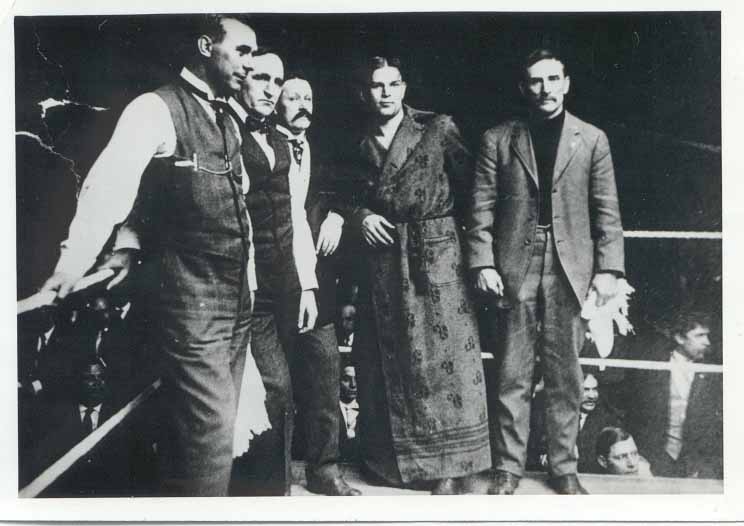 never met or read of a man like him. There is not an ounce of science in the ring that
he does not know about. He uses pure brainy science.
never met or read of a man like him. There is not an ounce of science in the ring that
he does not know about. He uses pure brainy science.
"He wrestles fair and in a legitimate way. It is a new style and
we know nothing about it here. Yet there is nothing about wrestling that he does not
know, and he always keeps within the rules.
"Gotch is a straight, gentlemanly fellow, and I don't think he
would ever do anything outside the rules If he were beaten, he would accept his
defeat like a Britisher. He would not shake hands and then go away and say things 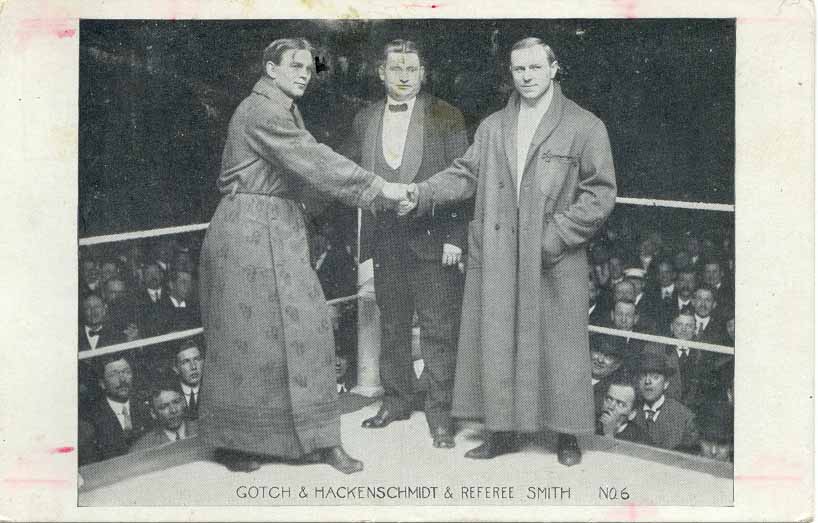 about his opponent. If all Hackenschmidt says is true, why did he shake hands with
Gotch in friendly way after the contest? Why did he not leave the ring disgusted?"
(Gotch book, 1913, page 148)
about his opponent. If all Hackenschmidt says is true, why did he shake hands with
Gotch in friendly way after the contest? Why did he not leave the ring disgusted?"
(Gotch book, 1913, page 148)
The stage was set for a rematch with Hackenschmidt, but Gotch was now angry and
Hack was, frankly, scared and intimidated. He knew he couldn't beat Gotch, but the
drums were beating for a rematch. He would look like a coward if he backed out, and
Curley, who was a good friend of his, actually thought Hack would win. By the time
Hack got to America, he was starting to believe he had a chance. And then he heard
stories that Gotch was training like a madman up in Humboldt...running long miles
through the sloping countryside, and trading off with four and five training partners
every workout. Word filtered back that Gotch really disliked him, and was going to
make him pay for all Hack had been saying about him. Like everyone else, Hack was
intimidated by Gotch's toehold...a torturous movement that Frank would use to force
wrestlers to their back for a pin.
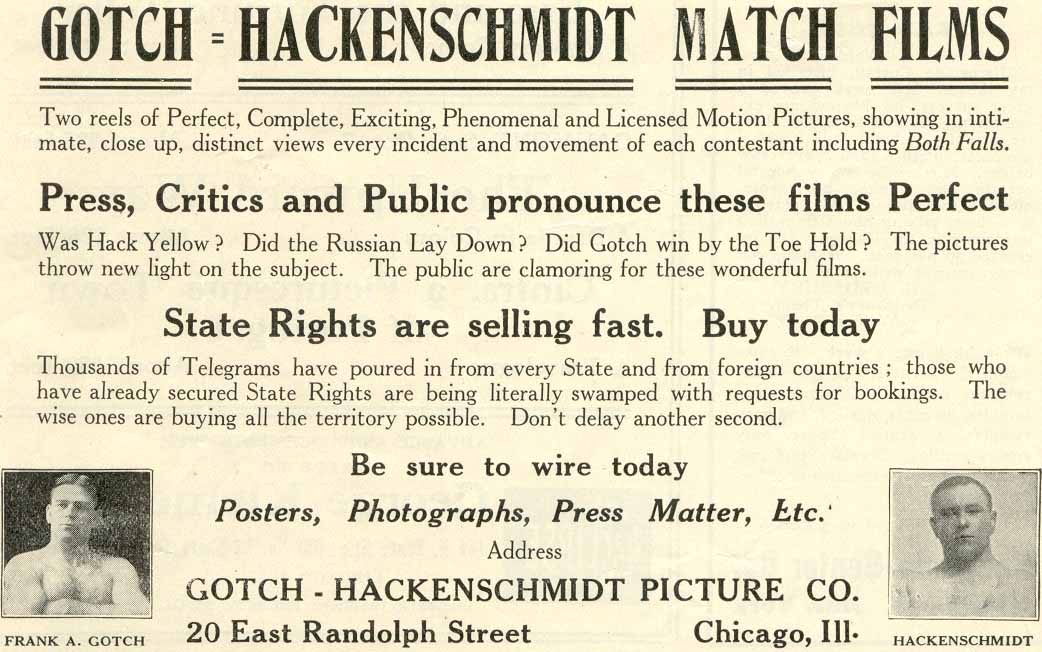
Hackenschmidt began to lose courage as the match approached. Then, working with an
American wrestler named Benjamin Roller, he injured his knee three days before the
match. Both Hack and Roller heard the knee pop. How serious was the injury? Roller
says it was nothing that would stop a "game man." Jack Curley, writing for The
Ring magazine in 1931, told what has to be considered the most accurate version of
the injury...since Curley liked Hack and was with him all during the time. Here's
what Curley said some 16 years AFTER the death of Frank Gotch, and while Hack was
still very much alive. Curley would have no reason whatsoever to falsify
any statements:
"I come now to one of the most discussed episodes in the history of American sports
¾ the great wrestling match in which Frank Gotch defeated George Hackenschmidt at
Comiskey Park on Labor Day, September 4, 1911. I was Hackenschmidt's manager and one
of the promoters of the contest. I wish to set for the facts concerning it and give,
for the first time, my side of a controversy which has engaged sports followers for
the last two decades."
Curley writes that Hackenschmidt was in sensational shape, and then wrenched his
knee in a workout with Roller a week before the match (some have claimed it was Ad
Santel who did it, but nowhere is Santel mentioned by anyone. Santel wasn't even
in camp, it seems safe to say). Curley called in "Dr. McNamara, a physician
well-known in Chicago...he examined Hack's injury and pronounced it trifling but,
to satisfy both hack and myself that his diagnosis was correct, had x-ray photos
taken of the knee. They bore out his diagnosis absolutely."
Of the first fall, Curley wrote: "Gotch scored a fall with a
crotch hold in sixteen minutes and the men returned to the dressing room. Hack, 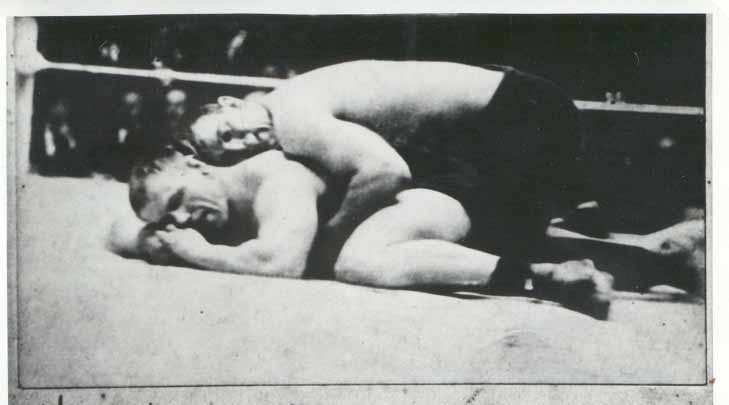 though fairly thrown, had made a great showing. Apparently, he had forgotten about
his knee injury."
though fairly thrown, had made a great showing. Apparently, he had forgotten about
his knee injury."
Gotch also wont he second fall with relative ease. Curley wrote
this summation: "Disappointed as I was at Hack's defeat, I was pleased with the way
the match had been conducted. I could see no fault with it. I had thought that Hack
would win but I had been wrong. The better man won."
Despite Curley's statements, word continued to spread that the
match was fixed, or that Hack was seriously injured, or that Gotch wrestled unfairly.
It's all ridiculous. Finally, in 1968, the most respected wrestling writer of all time
weighed in. No one has ever said an unkind word about Barton as a fair man or as a
great reporter. What is most important about his story, however, is that he WAS
THERE AT RINGSIDE. This is a first-hand account by the finest wrestling reporter ever.
Here's what he had to say in the December 1968 issue of The Ring Wrestling magazine:
"I take strong exception to Hackenschmidt's accusing Gotch of gouging, heeling,
kneeing, butting and using his knuckles to blind him in their first bout. I know that
Gotch did not resort to any foul tactics but won on his own merits.
"I can speak with authority in taking exception to these charges
because as sports editor of The Minneapolis Daily News I was at ringside and reported
the match..."
Later in the article, Barton adds this fascinating paragraph:
"Among the noted wrestlers who worked under my promotion for a
quarter of a century, in addition to Gotch, were Hackenschmidt, Stanislaus Zbyszko,
Yussiff Mahmout, Ivan Padubny, Hjalmar Lundin, Ivan Linow, John Freeberg, Henry
Ordemann, Dr. B.F. Roller, Fred Beall, Charley Olson, Charley Cutler, Yankee Rogers,
Jess Westegaard, Hans Steinke, Jimmy Londos, Bill Demetral, Ed Strangler Lewis, Joe
Stecher, Earl Caddock, John Pesek, Martin Pleistina, George Bothner, Walter Miller,
Chris Jordan, Johnny Meyers, Bull Montana, Mike Yoekl, Wainow and Ralph Paracut.
"Having seen all of these wrestling greats in action, I hail Gotch
as the greatest of all time."
To add more power to his feelings, he closes the article thusly:
"Great wrestlers come and go, fighting desperately to approach
the Gotch standard and never quite making it. It is to be hoped once and for all
aspersions on Frank as the mat's all-time paragon are discontinued."
Combine this opinion with those above of Nat Fleischer, Ed
Strangler Lewis, Tom Jenkins and Jack Curley and it's almost impossible not to
concede that Frank Gotch is the greatest professional wrestler to ever step on a mat!


|